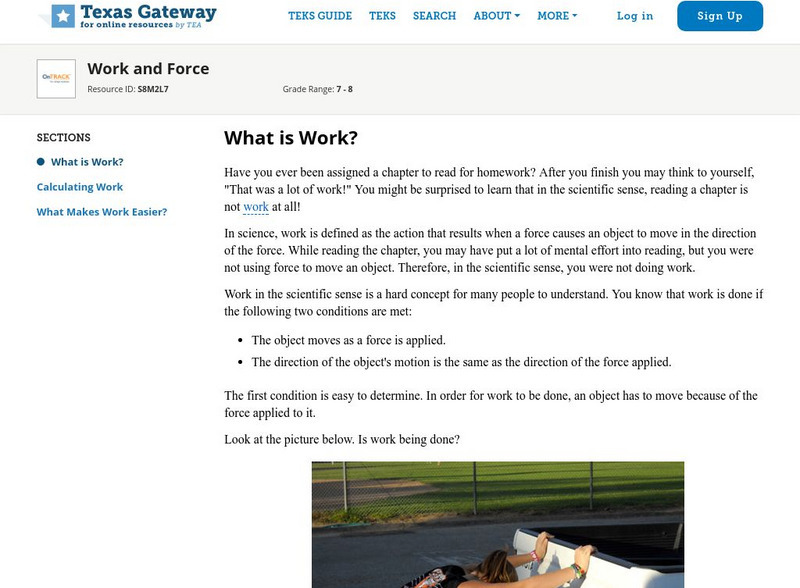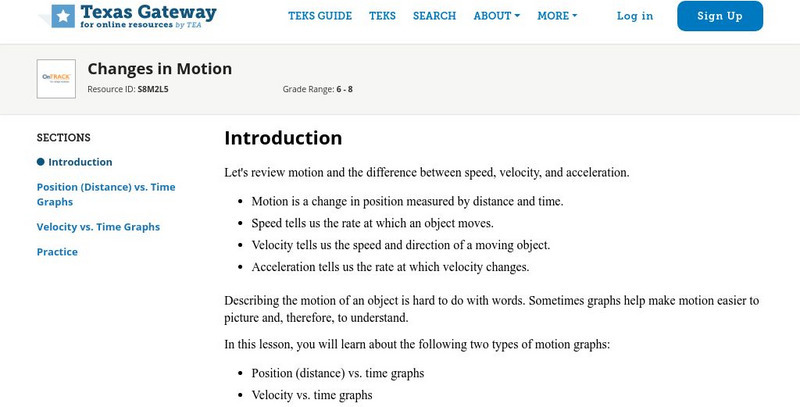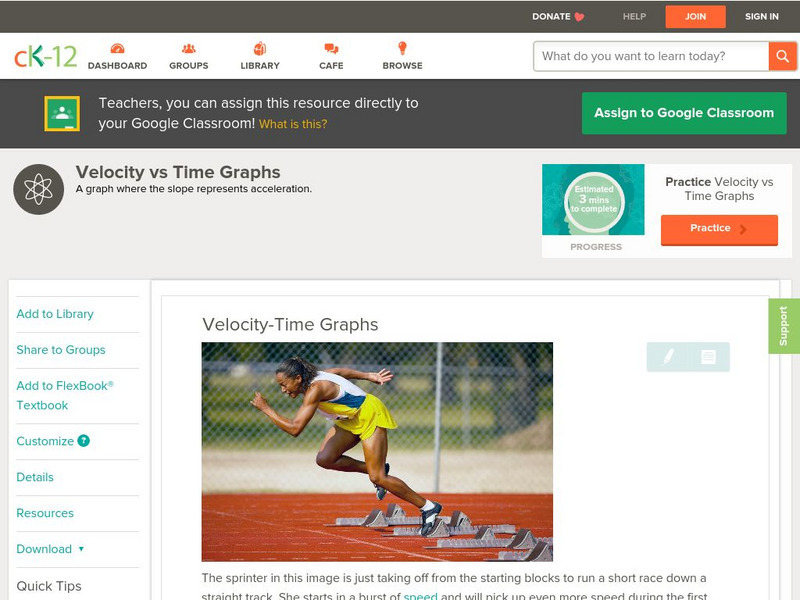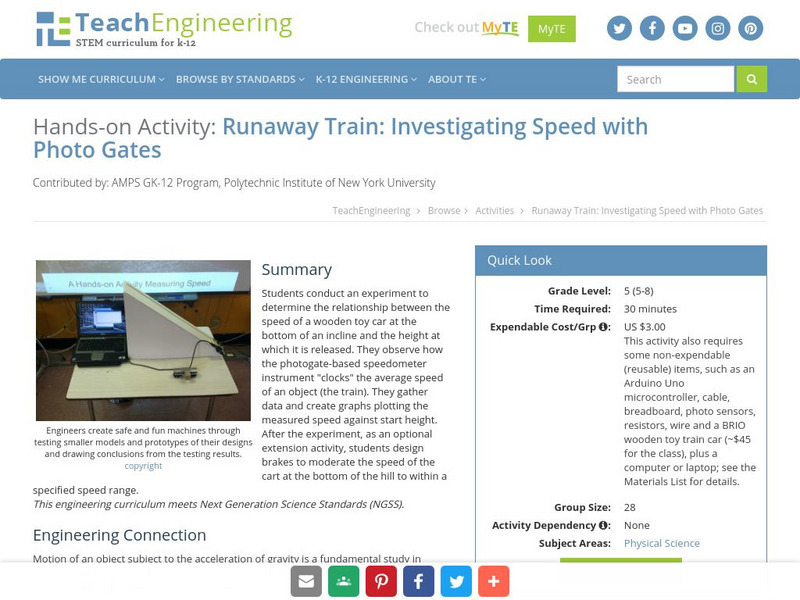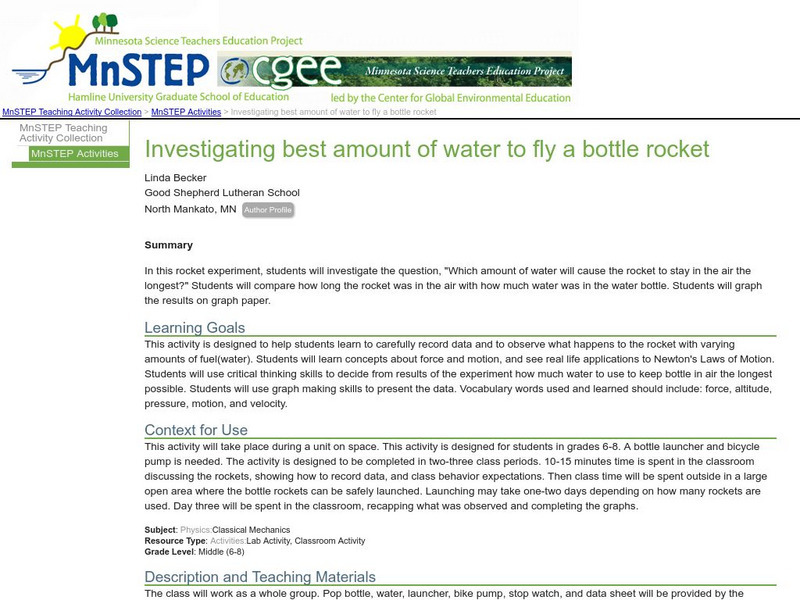Science Education Resource Center at Carleton College
Serc: Investigating Motion Graphing Speed
In this introduction to motion activity, learners will get a personal understanding of speed and acceleration by experiencing it firsthand. Wheeled office chairs or other cart like devices are used to give one student a ride as a fellow...
CK-12 Foundation
Ck 12: Episd: Velocity Time Graphs
[Free Registration/Login may be required to access all resource tools.] Break down graphs illustrating velocity and time to understand motion.
CK-12 Foundation
Ck 12 Exploration Series: Simulations: Physics: Irwin and Ruthie
[Free Registration/Login Required] Learn about the relationship between position, velocity, and acceleration for two objects in one-dimensional motion. Experiment with varying approaches to the race for both Irwin and Ruthie to see how...
Texas Education Agency
Texas Gateway: Work and Force
Given descriptions, illustrations, graphs, or charts, students will contrast situations where work is done with different amounts of force to situations where no work is done, such as moving a box with a ramp and without a ramp or...
Texas Education Agency
Texas Gateway: Changes in Motion
In this lesson, you will learn about position vs. time graphs and velocity vs. time graphs and how to use them to solve problems.
CK-12 Foundation
Ck 12: Physical Science: Velocity Time Graphs
[Free Registration/Login may be required to access all resource tools.] How to draw a velocity-time graph and what it represents.
Concord Consortium
Concord Consortium: Stem Resources: Motion on a Ramp
Using a motion detector, students produce graphs that show the motion of a toy car as it moves on a ramp. Students collect distance versus time graphs and velocity versus time graphs as well as predict what the motion will look like on...
Texas Instruments
Texas Instruments: Graphing Motion
This activity assesses students' knowledge and understanding of graphing motion.
CK-12 Foundation
Ck 12: Episd: Position Time Graphs
[Free Registration/Login may be required to access all resource tools.] Understand how to evaluate data presented in graphs based on speed and velocity calculations.
CK-12 Foundation
Ck 12: Physical Science: Position Time Graphs
[Free Registration/Login may be required to access all resource tools.] How motion and speed can be represented by a distance-time graph and how average speed can be calculated from it.
Physics Classroom
The Physics Classroom: Circular and Satellite Motion: Roller Coaster Model
An interactive playground for students to explore the physics of roller coasters. Learners investigate by changing the variables of force, velocity, friction, and vectors. Energy bar charts are displayed as the coaster car moves along...
TeachEngineering
Teach Engineering: Runaway Train: Investigating Speed With Photo Gates
Students conduct an experiment to determine the relationship between the speed of a wooden toy car at the bottom of an incline and the height at which it is released. They observe how the photogate-based speedometer instrument "clocks"...
Science Education Resource Center at Carleton College
Serc: Newton's Second Law: How Does Acceleration Change With Varying Forces?
In this lab activity, young scholars investigate the effects of changing force on the acceleration of a lab cart testing Newton's Second Law of Motion. They will use distance and time to calculate velocity and create a graph representing...
CK-12 Foundation
Ck 12 Exploration Series: Simulations: Physics: Butterfly Stroke
[Free Registration/Login Required] Learn about the relationship between velocity and position for a swimmer. Adjust the velocity of the legs, streamline, and arms to experiment with the slope of velocity in the simulation swimmer. Dig a...
Science Education Resource Center at Carleton College
Serc: Investigating Best Amount of Water to Fly a Bottle Rocket
In this rocket experiment, students will investigate the question, "Which amount of water will cause the rocket to stay in the air the longest?" Students will compare how long the rocket was in the air with how much water was in the...
Physics Aviary
Physics Aviary: Circular Force Lab
This lab is designed to have students find the relationships that affect the force required to keep an object moving in a circle. Students will be able to modify the mass of the object, the speed of the object and the size of the circle...
Concord Consortium
Concord Consortium: Stem Resources: Building a Bungee Jump
Students are asked to create a bungee jump that will protect a hard-boiled egg from breaking. A force sensor is needed to measure the push/pull forces on the egg. Data is inserted into force-time graphs. After completing three...
CK-12 Foundation
Ck 12 Exploration Series: Simulations: Physics: Model Rocket
[Free Registration/Login Required] Learn about the relationship between position and velocity for a model rocket during launch and in free-fall. Experiment with rocket mass, rocket thrust, and rocket burn time to understand the...
Texas Instruments
Texas Instruments: Classroom Activities: Parachuting
This activity explores a parachutist and her position, velocity and acceleration. Graphing and calculating these functions will be required.
CK-12 Foundation
Ck 12: Plix Series: Average Acceleration
[Free Registration/Login Required] Build the appropriate graph curve to illustrate an acceleration problem. After the activity, answer a challenge question to check for understanding.
Concord Consortium
The Concord Consortium: Molecular Workbench: Mass Connected to 2 Springs
Observe how friction affects a mass connected to two springs that are on opposite sides of the mass. Create a graph while the friction is on or off.
CK-12 Foundation
Ck 12 Exploration Series: Simulations: Physics: Driverless Car
[Free Registration/Login Required] Learn about adding two vectors together by components in the context of a GPS-style city map. Adjust magnitude and angles in the two vectors to simulate the driverless car. Examples taking this concept...
CK-12 Foundation
Ck 12: Plix Series: Newton's First and Second Laws
[Free Registration/Login Required] Read a force scenario, and then analyze the graphs provided to gain an understanding of inertia and force. After the activity, answer three challenge questions to check for understanding.



